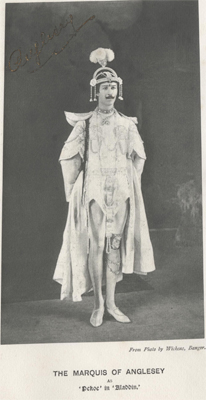Henry Cyril Paget, 5th Marquess of Anglesey (16th June 1875- 14th March 1905), styled Lord Paget until 1880 and Earl of Uxbridge between 1880 and 1898, nicknamed ‘Toppy’ was a British peer known for spending his inheritance on an extravagant social life and accumulating massive debts during his brief life. He was the eldest son of the 4th Marquess and the great grandson of famous war hero Field Marshal Henry William Paget, known as ‘Toppy’ to his friends. On June 16th 1875, he was born in Paris to The Marquess’ second wife, Blanche Mary Boyd Paget amid much speculation regarding his true paternity, with many believing his father was French actor Benoit-Constant Coquelin. Paget was fostered by Coquelin’s sister in Paris from the age of two to eight.
Following his father’s third marriage to an American heiress, Paget was taken to live at Plas Newydd, Anglesey, when he was eight years old. His upbringing at the Anglesey mansion was thought to have been solitary, with only an elderly nanny and a plethora of dogs to keep him company. Paget’s wealthy upbringing earned him a seat at Eton and, somewhat unexpectedly, a commission as a Lieutenant in the Royal Welsh Fusiliers. He acquired the title and authority of the family properties after his father died in 1898, including the family residence at the Anglesey mansion.
He was expected to marry, have children, and live a respectable life as a man of high position and fortune in order to be accepted by his peers and Victorian society. On January 20, 1898, he married his cousin Lillian Florence Maud Chetwynd according to tradition. During their honeymoon in Paris, the Marquess bought an entire window display of diamonds for his new bride. He would merely sit and marvel at her physique, decked with brilliant emeralds, diamonds and rubies as this was the closest the two would approach to intimacy. Her lovely skin, beautiful complexion and slender frame were thought to be everything the Marquess aspired to be. Their three year marriage was later annulled due to the fact that it had never been consummated.
He turned his attention to his passion for acting, converting the family church into a magnificent 150-seat theatre he christened The Gaiety, where he invariably played the lead. He hired professional actors from London who were visiting nearby Llandudno on the promise of an unbelievable wage for his first performance, Aladdin, and blazed a pathway of burning torches going up to Plas Newydd to guide visitors to his self-styled theatre. A series of custom-made outfits, studded with actual diamonds, were created by couturiers or the London costumiers Morris Angel. The cost of only one performance was estimated to be in excess of £46 million. His most famous act, however, was the ‘Butterfly Dance’, for which he was dubbed ‘The Dancing Marquess’. During the intermissions, he would make a spectacle of himself by performing, ‘sinous, sensual, snake-like dances’ inspired by famed American dancer Loie Fuller, in which a voluminous robe of transparent white silk would be waved like butterfly wings. The Marquess would hand out photo postcards of himself draped on a chaise longe, decorated in his cherished costumes, or behind the wheel of one of his many cars after each of his remarkable performances.
Paget’s sexuality had long been a source of conjecture, and it remains so now, despite his rejection of traditional concepts of gender, class and demeanour. Paget was dubbed the most renowned aristocratic homosexual at this period by reformed H. Montgomery Hyde in 1970. Others claim that he was far too enamoured of himself to consider having a relationship with anyone else. Many people assumed Paget was gay because of his extravagant and flamboyant lifestyle, his penchant for cross-dressing, and the breakup of his marriage. There is no indication that he had any lovers of either gender; rather, according to performance historian Viv Gardner, he was a ‘textbook narcissist: the only person he could love and make love to was himself, because, for whatever reason, he was ‘unlovable’. The Marquess was featured in a study of 20-th century sexuality by eminent sexologist Iwan Bloch, who noted that in the early 1900s, the Marquess could be spotted going through streets of London, perfumed and carrying his famed poodle, decked with pink ribbons, under his arm.
Eventually, he caught tuberculosis and died- with ex-wife Llily by his side – in Monte Carlo’s Hotel Royale. He lived swiftly and died prematurely, at the age of 29.
The land and title were passed down to his cousin, Charles Paget, who, like the rest of the judgmental nobility, despised the young Lord’s flamboyant unorthodox lifestyle- and the fact that he squandered the family riches. For burial, his bones were to Llanedwen. Despite what was known about him, the people of Bangor were saddened to learn of his death because despite his oddities, he was greatly liked there, according to the Times. However, his unorthodox lifestyle violated practically every aristocratic social norm at the time, prompting mocking obituaries.
The Aladdin programme is part of Storiel’s collection and was the programme for the first play performed at the Gaiety Theatre, Plas Newydd Anglesey.

